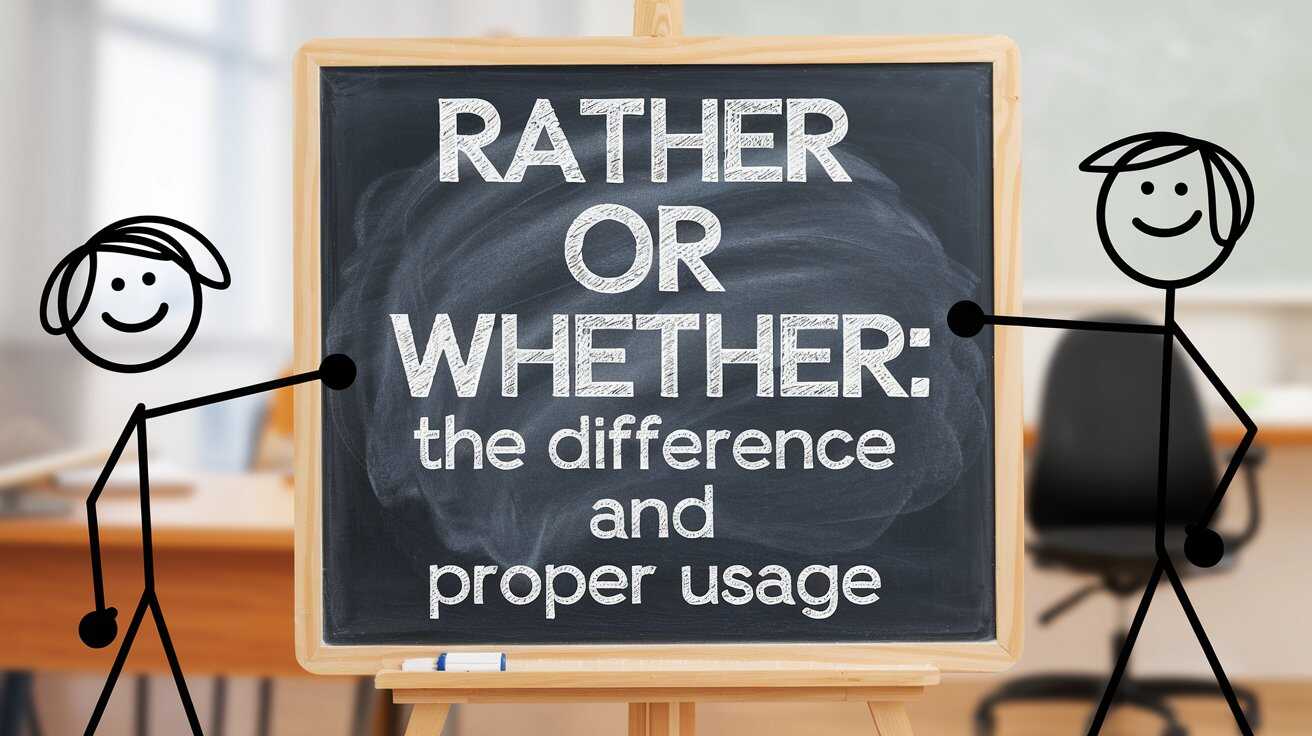English can be confusing, especially when words look or sound alike but serve different purposes. One such pair is rather or whether. While they may appear similar, their meanings and uses differ significantly.
Understanding the difference between rather and whether is essential for clear communication. In this article, we’ll break down their meaning, proper usage, common mistakes, and complex sentence structures, ensuring you use them confidently in writing and speech.
What is the Meaning of “Rather”?
The word rather is an adverb that expresses preference, emphasis, or contrast. It’s frequently used in English to show choices, highlight the degree of something, or add nuance to a statement.
Key Functions of “Rather”
- Expressing preference
- I would rather walk than take a taxi.
- She’d rather eat at home than go out.
- Emphasizing degree (used similarly to “somewhat” or “quite”)
- That test was rather difficult.
- It’s rather hot outside today.
- Showing contrast or softening statements
- I was rather disappointed with the results.
- The food was rather bland, but the service was excellent.
This flexibility makes rather meaning in English crucial for nuanced expression.
Examples of “Rather” in Sentences:
To better grasp the proper usage of rather, here are more examples of rather in sentences:
- I’d rather take a direct flight than have a layover. (preference)
- His response was rather surprising. (emphasis on degree)
- She is rather good at painting, don’t you think? (soft contrast)
Notice how “rather” enhances the meaning without altering the sentence structure.
Additional Uses of “Rather”
Besides its common meanings, “rather” also appears in idioms and fixed expressions:
- “Rather than” (instead of) → I’ll drink tea rather than coffee.
- “Would rather” (preference) → He’d rather be early than late.
- Polite disagreement → I’d rather not comment on that matter.
These subtle variations highlight the correct way to use rather and whether.
What Does “Whether” Mean?
Unlike “rather,” which expresses preference, whether is a conjunction used to indicate choices, uncertainty, or conditions.
Key Functions of “Whether”
- Introducing choices (with or without “or not”)
- I’m not sure whether I should accept the offer.
- Tell me whether you agree or not.
- Expressing uncertainty
- She hasn’t decided whether to attend the wedding.
- We don’t know whether it will rain tomorrow.
- Setting up conditional statements
- Success depends on whether you work hard.
- The meeting will happen whether he arrives or not.
Here, the meaning of whether revolves around introducing alternative possibilities.
READ MORE >>> Wanderlust or Wonderlust: The Correct Word and Its Meaning
Examples of “Whether” in Sentences:
For clarity, let’s explore examples of whether in sentences:
- She couldn’t decide whether to buy the red dress or the blue one.
- I wonder whether he’ll join us later.
- We must determine whether the new policy is effective.
These show how whether introduces choices and uncertainty in different contexts.
The Key Difference Between “Rather or Whether”
The key difference between rather and whether is their function:
| Word | Function | Example |
|---|---|---|
| Rather | Expresses preference, degree, or contrast | I’d rather go now. |
| Whether | Introduces choices, uncertainty, or conditions | Tell me whether you agree. |
So, when considering rather vs whether, remember:
- Use rather for preference and emphasis.
- Use whether for choices and uncertainty.
Common Mistakes with “Rather or Whether”
Example 1: Incorrect Use of “Rather”
❌ I don’t know rather he will come or not.
✅ I don’t know whether he will come or not.
Mistake: “Rather” cannot introduce uncertainty—only “whether” does.
Example 2: Incorrect Use of “Whether”
❌ I’d whether eat pizza than sushi.
✅ I’d rather eat pizza than sushi.
Mistake: “Whether” does not express preference—only “rather” does.
How to Use “Rather or Whether” in Complex Sentences
Mastering rather or whether in complex sentences can take your writing to the next level. Both words serve distinct purposes—rather expresses preference or emphasis, while whether introduces choices or uncertainty. However, when sentences become more intricate, knowing where and how to place them correctly is essential.
Misusing these words can lead to confusion or awkward phrasing. In this section, we’ll break down the correct way to use rather and whether in more advanced sentence structures, ensuring clarity and accuracy in your writing.
Using “Rather” in Complex Sentences:
- I would rather study at home, since the library is too noisy.
- She was rather surprised that the event started early, but she adapted quickly.
Using “Whether” in Complex Sentences:
- The professor asked whether we had completed the assignment, and I told him I had.
- We need to decide whether we should invest in new technology or upgrade the current system.
Both words fit naturally in structured writing when applied correctly.
Practical Tips for Using “Rather or Whether”
Here are some English learning tips for rather and whether:
- Use “rather” for preference and degree (I’d rather go now.).
- Use “whether” for uncertainty and choices (Let me know whether you agree.).
- Remember “rather than” replaces “instead of” (She walked rather than took a taxi.).
- “Whether or not” adds certainty (I’ll go whether or not it rains.).
- Don’t swap them! Using one in place of the other can make a sentence grammatically incorrect.
FAQ’s
What is the difference between Rather and Whether?
The difference in usage rather vs whether is that rather expresses preference or emphasis, while whether introduces choices and uncertainty.
Can Rather and Whether be used together?
Rarely, but it’s possible:
- I’d rather know whether he’s interested before I make a decision.
Are Rather and Whether interchangeable?
No. Grammar mistakes with rather and whether happen when they’re used incorrectly in place of each other.
Conclusion
Mastering the difference between rather and whether will enhance your grammar skills and clarity in writing.
- Use rather to express preferences and emphasis.
- Use whether to introduce choices and uncertainty.
- Avoid common mistakes and apply these words correctly in complex sentences.
By following these practical tips for using rather or whether, you’ll sound more polished and precise in English. Keep practicing, and soon, choosing between rather or whether will feel natural!

